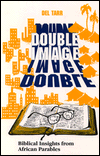

 |

|

The average rating for Double image based on 2 reviews is 4.5 stars.
Review # 1 was written on 2020-10-19 00:00:00 Derrick Jordan Derrick JordanThis is a very helpful book in de-colonizing our reading of Scripture and analyzing the breadth of ways different cultures read, understand, and live out holy scripture. |
Review # 2 was written on 2013-07-31 00:00:00 Anthony Glaser Anthony GlaserIn one of the most readable of the Radical Orthodoxy series, Tracey Rowland argues that the Second Vatican council (specifically the document Gaudium et Spes) created a crisis for the Catholic Church by failing to think carefully about the culture theologically, thus opening the door for many to adopt the assumptions of modernity, which in its tilt away from transcendence is hostile to Christianity. In using phrases like “modern world”, “autonomy”, and “accommodation” (aggiornamento) but failing to consider the theological and philosophical freight accompanying these terms, the council missed an opportunity for an "elaboration of a theology of culture." (17) The document, notable for its positive posture towards the world, has been interpreted in two divergent directions. The interpretation given by John Paul II (which Rowland affirms) is that the longings of modernity embodied in the pursuit of art, sciences and human rights should be affirmed, so long as it is understood that these things can only find their fulfillment in Christ. In other words, we can adopt the rhetoric of modernity but must critique and redeem the underlying framework. The other interpretation not only adopts the rhetoric but also the immanent framework of modernity, failing to see that on can have “a culture that embodies a belief in rights and duties without having any interest at all in a notion of justice that is linked to transcendent truth, including the theological virtues of faith, hope, and charity." (14-15, 160) In other words, it attempts to correlate the Church to the culture without considering how culture might be (and indeed is in the case of modernity) antithetical to faith. Rowland follows T.S. Eliot in drawing a threefold framework for culture: 1) the culture of the individual (Bildung, nomos); 2) the culture of institutions (Geist, ethos); 3) the culture of society as a whole (Kultur, logos). She then fills this outline in with theological content: "Thus an Augustinian Thomist conception of culture can be defined as one in which any given ethos is governed by the Christian virtues, the process of self-formation or Bildung is guided by principles of the Decalogue and revealed moral laws of the New Testament, and the logos or form is provided by the ‘identities-in-relation’ logic of the Trinitarian processions." (21) Following other proponents of Radical Orthodoxy, she rejects the idea of the secular realm: “no field that is ever truly 'secular' in the sense of being unrelated to, or autonomous of, theological presuppositions." (29) As she develops each of these ideas in subsequent chapters (ethos, nomos, logos), Rowland highlights a naiveté within the Church regarding culture. While it may be the case that classical culture actually prepared the way for the gospel; modern culture offers no such praeparatio evangelica since it is allergic to the transcendent; “the god who flourishes within the culture of modernity is one who has not had the courage to die, but instead has become a liberal” (161). The relationship between Church and culture is thus dialectical rather than complementary, fraught with “irreconcilable differences”. Here she follows Macintyre who in After Virtue casts the future of virtue as a choice between Nietzsche and Aristotle. Constructively, Rowland offers five proposals for responding to the current crisis. Yet the strength of this work is more on the diagnosis than on the cure. Indeed, it is easier identifying something significant that has been lost than identifying the road to retrieval. While Rowland is incisive in her call to think theologically about culture, I wonder if the Vatican council members were less naïve than she assumes, and were hopeful that even in an immanent frame, God by his Spirit is always preparing people for the gospel. |
CAN'T FIND WHAT YOU'RE LOOKING FOR? CLICK HERE!!!